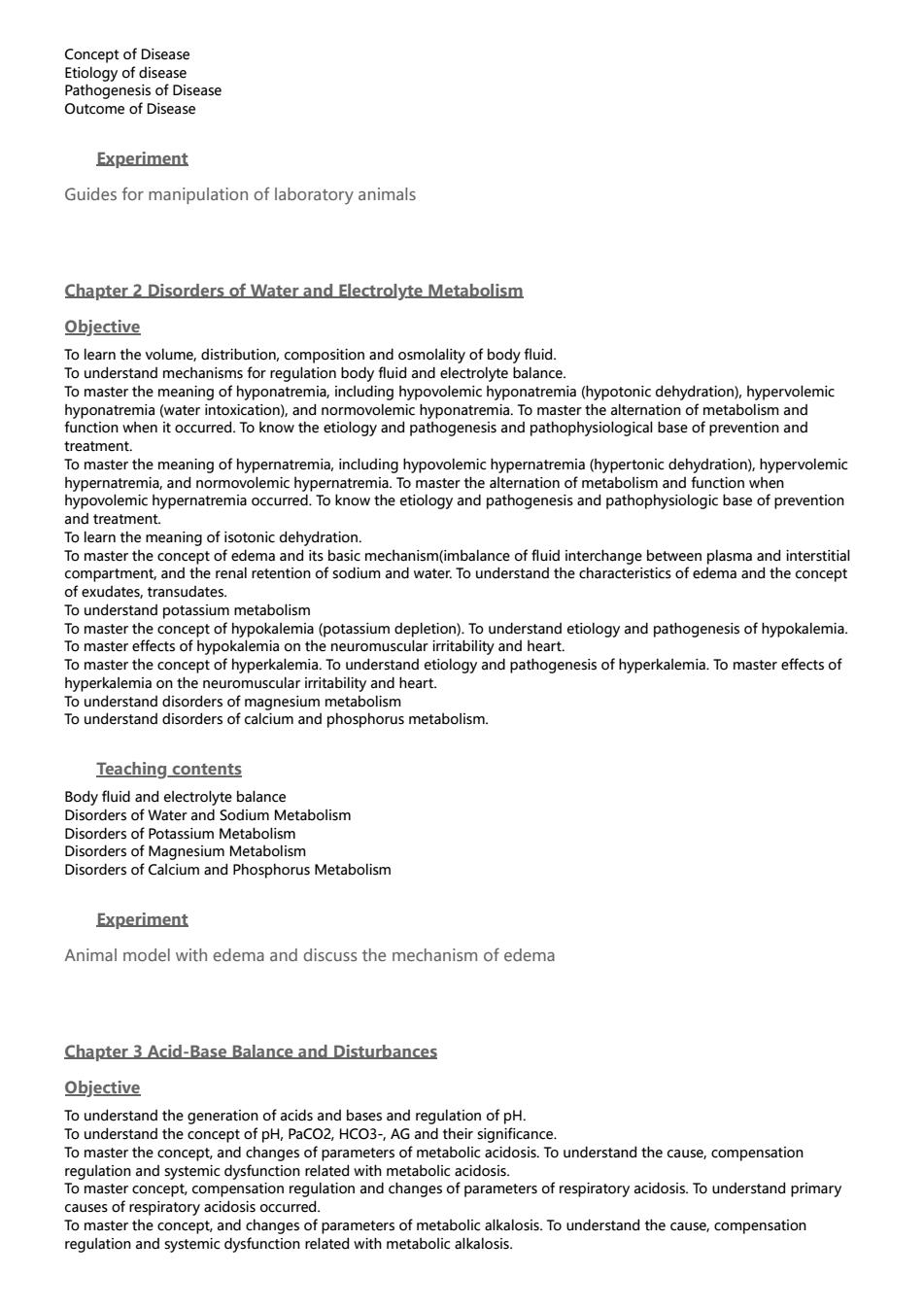正在加载图片...

Concept of Disease Pathogenesis of Disease Outcome of Disease Experiment Guides for manipulation of laboratory animals Chapter 2 Disorders of Water and Electrolyte Metabolism Objective To learn the volume,distribution,composition and osm glleotboeytiuia To master the meaning of hyponatremia.includinghy (hypotonic dehydration),hypervolemi treatment. Tomaster the meaning of hypematremia,incuding hypov yiemchypenaiemia2ocuearolnowhetiolo9yandpatiogenessandp3hopnsoogcb3eofprevention deeamen eaning of isotonic dehvdration To master the con understand Tounderstand potassium metabolism To master effects of hypok nd etiology and pathogenesis of hypokalemia To master the concept f hyperk emia.To understand etiology and pathogenesis of hyperkalemia.To master effects of ounderstand disorders of magnesium metabolism o understand di orders of calcium and phosphorus metabolism Teaching contents Disorders of Calcium and Phosphorus Metabolism Experiment Animal model with edema and discuss the mechanism of edema Chapter 3 Acid-Base Balance and Disturbances Objective To understand the ation of tion of pH To master the oncept and changes of parame ters of m cidosis.To understand the cause,compensation To master the conce parameters of metabolic alkalosis.To understand the cause. requlation and systemic dysfunction related with metabolic alkalosis. Concept of Disease Etiology of disease Pathogenesis of Disease Outcome of Disease Experiment Guides for manipulation of laboratory animals Chapter 2 Disorders of Water and Electrolyte Metabolism Objective To learn the volume, distribution, composition and osmolality of body fluid. To understand mechanisms for regulation body fluid and electrolyte balance. To master the meaning of hyponatremia, including hypovolemic hyponatremia (hypotonic dehydration), hypervolemic hyponatremia (water intoxication), and normovolemic hyponatremia. To master the alternation of metabolism and function when it occurred. To know the etiology and pathogenesis and pathophysiological base of prevention and treatment. To master the meaning of hypernatremia, including hypovolemic hypernatremia (hypertonic dehydration), hypervolemic hypernatremia, and normovolemic hypernatremia. To master the alternation of metabolism and function when hypovolemic hypernatremia occurred. To know the etiology and pathogenesis and pathophysiologic base of prevention and treatment. To learn the meaning of isotonic dehydration. To master the concept of edema and its basic mechanism(imbalance of fluid interchange between plasma and interstitial compartment, and the renal retention of sodium and water. To understand the characteristics of edema and the concept of exudates, transudates. To understand potassium metabolism To master the concept of hypokalemia (potassium depletion). To understand etiology and pathogenesis of hypokalemia. To master effects of hypokalemia on the neuromuscular irritability and heart. To master the concept of hyperkalemia. To understand etiology and pathogenesis of hyperkalemia. To master effects of hyperkalemia on the neuromuscular irritability and heart. To understand disorders of magnesium metabolism To understand disorders of calcium and phosphorus metabolism. Teaching contents Body fluid and electrolyte balance Disorders of Water and Sodium Metabolism Disorders of Potassium Metabolism Disorders of Magnesium Metabolism Disorders of Calcium and Phosphorus Metabolism Experiment Animal model with edema and discuss the mechanism of edema Chapter 3 Acid-Base Balance and Disturbances Objective To understand the generation of acids and bases and regulation of pH. To understand the concept of pH, PaCO2, HCO3-, AG and their significance. To master the concept, and changes of parameters of metabolic acidosis. To understand the cause, compensation regulation and systemic dysfunction related with metabolic acidosis. To master concept, compensation regulation and changes of parameters of respiratory acidosis. To understand primary causes of respiratory acidosis occurred. To master the concept, and changes of parameters of metabolic alkalosis. To understand the cause, compensation regulation and systemic dysfunction related with metabolic alkalosis